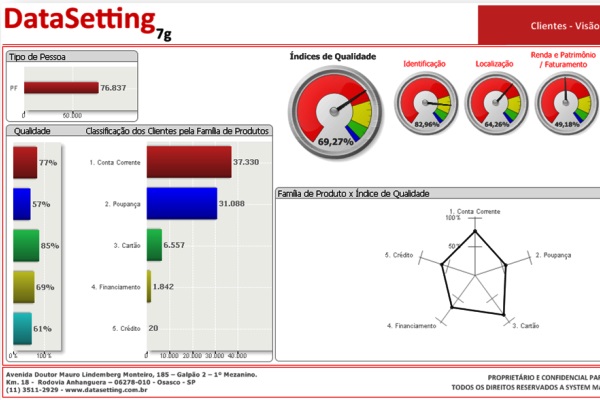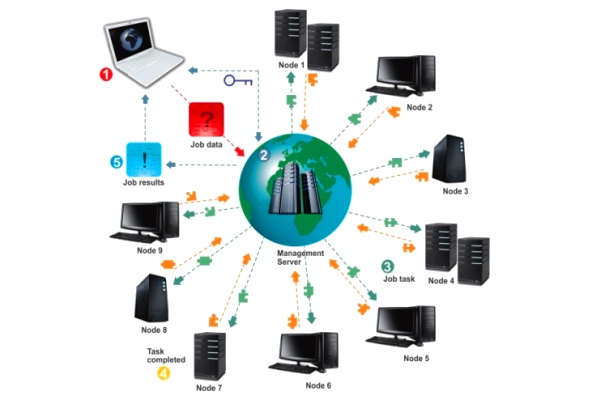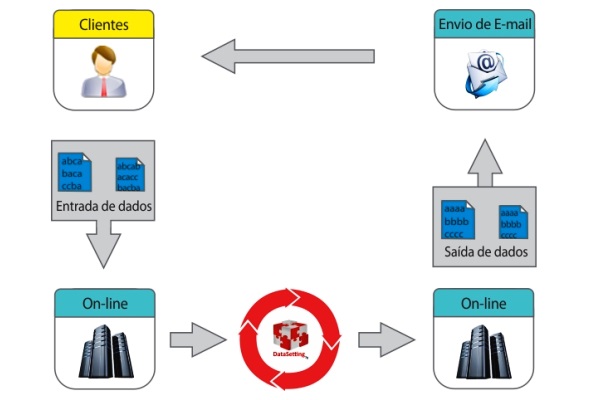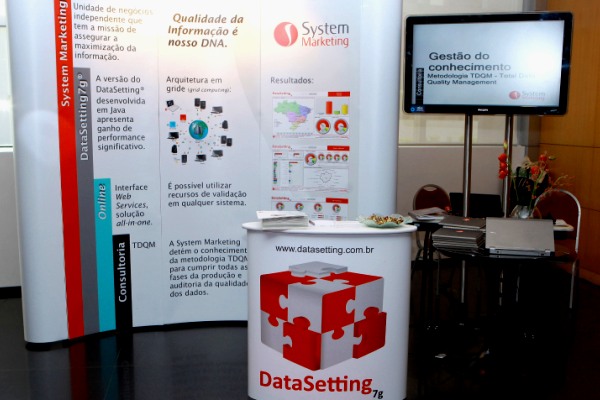System Marketing: Business Intelligence and Data Management in Brazil
System Marketing is a company with 15 years of experience operating in qualification and enrichment of database, consulting and TDQM (Total Data Quality Management). Guilherme Rocha presents the company and gives an overview of the BI and data management sector in Brazil.
Interview with Guilherme Rocha, President of System Marketing
Let’s first talk about the sector. How do you assess the sector you are currently in?
We are in business intelligence. You need to consider that BI technology is just a tool that will allow you to have access to the knowledge in behind the data you will collect. We mainly focused our company in this sector of allowing our clients to get the real information and the real knowledge about their strategic decisions from the data that they have. In order to do that, you must know how to put data together and separate what really counts when you are doing such analysis.
First, we used to sell just database and analytics software to clients like banks and telecom companies and retail marketing companies. At that time, about 15 years ago, we realized that the problem of the market in general is that we don’t just need technology but we need to know how to bring data together. Good data with the technology helps you make good decisions.
How would you describe this sector in Brazil?
The BI sector is already a 290 million dollar business in Brazil, just talking about the technologies that have been sold. We are not just talking about the consulting and the services. If you consider that, in 2017, our market will be as big as 1 billion US dollars. When talking about the BI sector, there is real growth coming and we are experiencing this situation right now. It’s really attractive and you need to be forward-thinking in terms of what you offer because my feeling is that there is a big confusion coming because of the big data and all the tools that you can get to extract information from that.
A comparison is that it is like the oil of business. If you know how to extract it, you are going to be a successful company. It is the same concept that we are using in our case – how to extract the oil for your company. It doesn’t matter if you have it under your feet if you cannot take it away. This is the overall impression that I have and that’s why we are in this business right now.
Is there any interest from any foreign company to come and play individually or maybe partner with some local companies? What is the Brazilian market’s feeling about this?
The Brazilian market is the 6th biggest economy in the world. This is the first important piece of information that everybody needs to keep in mind when deciding whether to come to Brazil. The second is that you need to think in the long-term. Like any other type of investment, you need to consider that you have to come, understand the market, and learn about the clients. Even if you are an international company already working with international players that are already established in Brazil, you need to understand that we have our laws and rules and the game will be much better played if you have a local partner that already knows how to do it.

I mean this in terms of the priorities that you need to achieve when you send your salespeople outside, when you identify opportunities, and the lifecycle of sales. I had a chance to work with an English company a few years ago and I know it works to use a methodical approach to keep track of what you are doing in the sales process. But in Brazil, you cannot just come for lunch, for instance, and ask a client how hot the deal is that are you are dealing with. You need to spend 10 to 12 minutes talking about other things. You have a way of doing business and this is an important part of choosing a local partner to work with. It makes things easier and it makes things happen earlier.
What can potential partners expect as a revenue or potential market?
I can say this should be two digits for any type of good business that I can see in our area of influence. So when I talk about two digits, we are talking about reasonable growth for any type of growth you see in a business. If you think about two digits, you are thinking about initial investment that can support that. It’s not just a type of proof-of-concept project that you are going to come and feel out. You definitely need to be committed to the realities that you are going to face.
You need to plan and you need to have the right people. At the present we have a very competitive environment in terms of good talent and people are already working in big business so you need to think about the strategy for attracting those people to come to your company because they are going to make the difference. When you come to a partner like System or a local partner that has already faced this situation that would probably be an easier way to start something and get you half of the way.
Please describe exactly what your company does.
First when we were a value-added reseller for an international company, we used to sell just database and analytics software to clients like banks and telecom companies and retail marketing companies. At that time, about 15 years ago, we realized that the problem of the market in general is that we don’t just need technology but we need to know how to bring data together. Good data with the technology helps you make good decisions.

When we started the company, we realized that opportunity and started developing the product that we have. It’s a technology that can bring data together, analyze it and clean it, and then finally allow us to plug some sort of BI tool in to get good-quality data offering good reports and good decisions. Our focus right now is to help our clients understand how important it is to keep their attention on information and not just on technology. We see that the IT guys will face, in the near future, a split between the I and the T. The technology will follow the commodity type of path; costs will be reducing. Every time you see the cloud, you see many solutions that allow you to have the best state-of-the-art software without having to buy it. But on the other hand you have information and information is something that people are not aware of the importance of.
So we have been doing assessments with our clients to bring this important information for them and help them to take care of their data as a product. So the consulting services that we offer is a combination between the technology that helps them extract the data, combine it, and bring it to a certain level of accuracy that will finally allow good decisions, but also to look at their important departments to determine what would be the impact of that bad-quality data into their profits. We are not just figuring out any numbers, we definitely have meetings and interviews with our important decision-makers to get this information and finally bring them what is behind the line.
Like an iceberg, you have the underwater part of this impact – things that you do not see. For instance, when you send a letter and it returns, you have the peak of the iceberg because it is something that everybody knows and you need to take care of it. You burn it or throw it away but you don’t see what’s under that line. What is under that line is law problems and regulation problems and we have opportunities and income lost because of bad data. This is what we do. We have a component of extraction and knowledge, with the technology.
Can you give us some names of American, European and other companies in other markets that you would be comparable to?

I would say we are not as big as SAS but SAS does many things that we do, although our consultant services is much more focused in terms of finding this result instead of selling just the tool. Sometimes we have partnered with SAS to have their tool working for us, so it gives you a good idea to know the market segment in which we are working right now.
Can you explain your competitive advantages? What makes you different in this market?
For the last 15 years, we have maintained our position as a very well-known company in this data management segment because we have developed our tool for the Portuguese language for the Brazilian zip code and postal service structure. We brought experience that you will only find in this market in terms of data problems that has come to be a really good asset in terms of database knowledge. We brought all of this over the last 15 years into our tool.
So now if you have big companies coming with state-of-the-art technology in any part of the world, they will have to pass through this. I used to compare it to a wine that becomes even better with time. We have a tool that is really in good shape in terms of the quality that you will get for our local market. The experience is not just something that I am saying, but big clients like one of the top five banks and one of the three telecom companies are buying from us because they feel the difference. We deliver the results that they expect and we know the problems that our competitors don’t know about the quality and the data that we have in this language and in this country.
Are you interested in attracting investors into your business and what, if any, kind of investor are you looking for?
We had a chance to talk a little bit about that on some other occasions. You have the investors that will bring money to our operation just like any private equity. Maybe in some of our startup projects, we right now have four projects running under our roof in terms of innovation and technology, they would also be eligible for investors to share this with us. For our main company, we would definitely think about a strategic partner that would allow us to exchange knowledge about the local and international markets and help us grow in some other segments that we are not present in right now. That will reduce the timeline for us to embrace new market segments. That would be interesting if it is possible.

What kind of area might this strategic investor be in? How would it fit with your company?
We have different lines of business. We have a collections business that really requires knowledge about creditors, payors and debtors and this is specific to this whole cycle. Definitely if you think about some sort of partner in this segment it would be a company that has already experienced this in their portfolio. When you come to the collections business, you also have what they call “master servicing”, representing companies that work for the investment funds that are mainly based on credit. They work like a service bureau and do all the clearing for these big investment funds. So in this situation we would definitely be interested in discussing opportunities to work with any international player that already has this knowledge and experience.
If you look at the data management line of business, we can see in our segment right now that it is dominated by four important service bureaus. They are Experian, Boa Vista and Equifax, which are merging right now, TransUnion which is the third important player, and then Axciom. So we have four large bureaus already sharing this market and then you have some small ones. But of course if you are talking about a service bureau that has all the knowledge and requires the experience that you already have and the access to the big clients that we have developed over the past 18 years, that would be an interesting partnership to establish.
Finally, I would say the third line of business encompasses all the startup projects that we have. We have a technology collection project, a data exchange project, and in the genomics, a project already in place, and for the industry, a project already in place. They are all startups and we have been financing everything ourselves, so why not share this with another partner?
Do you have plans to expand outside of Brazil?
We have a partnership with a Swiss company and this partnership is to provide our clients with a tool for online data analytics so we imagine that in the near future we will be able to merge the offline with the online data analytics. This company has a product called Affinyze and we have been developing a new strategy to offer the product to our clients. It’s just the beginning of the partnership and it’s a two-way relationship. We are going to be ready to sell our knowledge and technology to the European market but definitely we need to set up some adjustments in the technology to accommodate the language and other requirements for the local market. I can tell you the Brazilian market is still a big opportunity for us. We have been doing well and we need to make sure that we have our space under the sun during this period of time. We don’t want to take our focus to other areas before being sure that we are currently on the right track.

How do you see the company in five years’ time? What is your dream for the company?
Like any type of company owner or entrepreneur, I would say that you want your company to keep going by itself. You need to prepare it by having good people on board so that you can spend your time where you really aggregate more value. We need to be sure that the right people we bring on board would be able to take care of our operational and daily activities so that we can put our minds to the anticipated future; this is where I would like to spend most of my time.
Like I said, we already have four startups underway and you need to give attention to that. Considering the lifetime of this business that we have, we need to give attention to the baby ones – those that are growing and are demanding more from us in terms of strategic planning and of course the marketing relationship that we already have. In five years, I hope we can be sitting in this chair managing the other four companies and being sure that the ones that we already have are doing fine and generating good results for their employees and executives, that the company life cycle goes ahead and gives us more opportunity to bring good staff in.
Do you have anything else to add?
Like we talked about previously, the attention of international investors must also be on the way they are going to make the commitment. I have had a chance to point out that it’s a long-term relationship. You need to get on board and understand the way things happen and help us or help the company they are going to come to invest in to grow but not forget to accept that you need to come and wait and understand and then grow.
We have seen some bad experiences in terms of coming and trying to make things the way they do outside. I’m not just blaming the strategy but things are different here. If you have a food chain and you come here and you think that Brazilian people will buy the same the menu you have outside, it’s not true. This must be customized to the reality. So the perspective will be great if you allow the local partner to have good participation in the overall strategy.
FAIR USE POLICY
This material (including media content) may not be published, broadcasted, rewritten, or redistributed. However, linking directly to the page (including the source, i.e. Marcopolis.net) is permitted and encouraged.